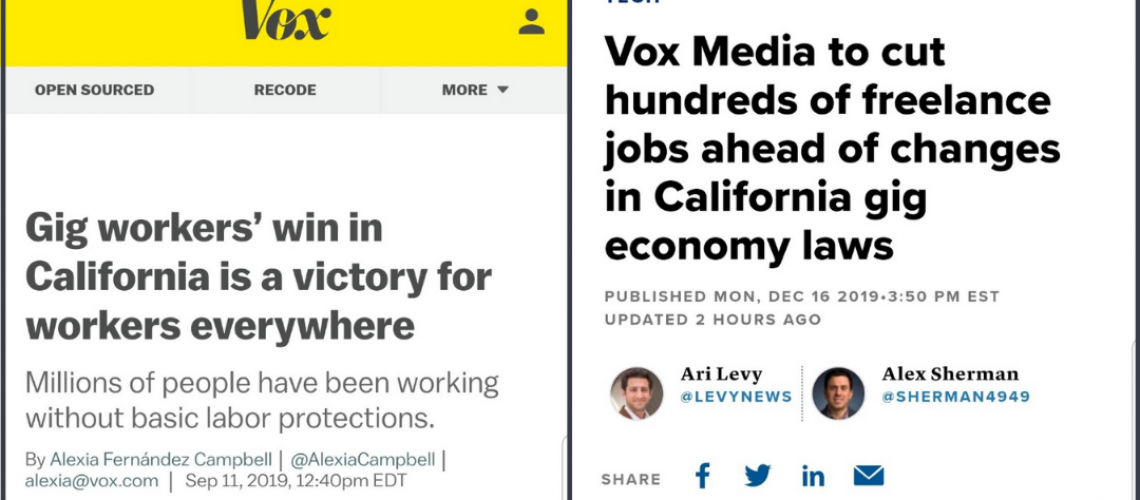Why is a company that utilizes so many talented freelance writers celebrating the passage of a law that would have such a devastating impact on freelancers across industries?
Reading these two headlines side by side frustrates the hell out of me.
The Vox article says the passage of California’s AB-5 is more than “just another progressive victory in California,” instead calling it “a historic moment for the US labor movement…”
Really? A law that now prevents people from voluntarily entering contractual relationships with companies to earn income is good for the labor movement?
In another revealing tidbit, the article says “[i]f any state can start to reverse the trend of shrinking labor unions, it’s California.” Ohhh, so that’s what they mean when they refer to a victory for the “labor movement.”
Their argument is that companies are deliberately misclassifying workers as independent contractors to avoid extending employee benefits like overtime and unemployment benefits.
In some situations, that may be true. However, let’s remember that freelancers take these jobs knowing that such benefits aren’t part of the deal. Let’s also remember the other benefits that make contract work attractive to freelancers – flexibility, additional income, autonomy, a chance to work in an area they enjoy, etc.
If the gig economy is so dangerous for workers, why has it grown so rapidly over the last decade? Why are so many people flocking to contract work if it leaves them so vulnerable to corporate exploitation?
The answer is because it’s not nearly as dangerous or exploitative as legislators (or the former writers at Vox) would have you believe. Instead – it allows people to work how they want, when they want, doing what they want. Why shouldn’t people be able to exercise such control over their professional lives?
My company is built on the work of freelance attorneys (yes, I realize that freelance attorneys are exempt under AB-5) and I can tell you that not a single one of them has ever said that the ability to take on extra work and earn supplemental income on a flexible schedule left them feeling exploited.
If anything, it empowers them! They’re doing freelance work because they want to. Because they’re starting their own practice and need the side-work until it gets off the ground -or- because they’re semi-retired but still enjoy practicing on their own terms -or- because they’ve decided to start a family but want to stay involved on some level but the 9-5 office life doesn’t work for them anymore.
Obviously, this isn’t just about lawyers. Take Uber for instance, whose drivers stand to suffer most under AB-5. I had an Uber driver this week who eagerly explained that he does it to help pay for his daughter’s education at Boston University. He was upbeat, smiling the whole ride and appeared genuinely grateful for the opportunity to drive an Uber because he could do it on his terms *and* it helped him provide a great education for his kid. If he was in California, there’s a good chance he would no longer have that opportunity.
Simply put, political victories don’t necessarily equate to victories for the constituents. And like most laws we see rushed through the legislative process – AB-5 and those like it are designed to fix a problem that is nowhere near as pervasive as we’re told *and* the unintended (or perhaps, intended) consequences will be devastating for those who choose (and love) to work as independent contractors.
The gig economy has sparked a flood of opportunity, innovation and investment that have benefited millions of people – all of which will be stifled by this new legislation.
Companies can’t just turn around and hire all these people as full-time (or even part-time) employees – it’s simple math. There is little doubt that these laws will force companies to hire less or simply move out of these states altogether – and who can blame them?
So while Vox, politicians and labor unions call this a huge victory for the labor movement, I’d say it’s a stinging defeat for anyone who actually needs the work.


